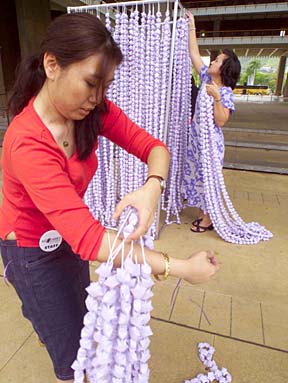
DEAN SENSUI / DSENSUI@STARBULLETIN.COM
Sara Funamura, a social worker with the Alzheimer's Association-Aloha Chapter, helped gather some of the 20,000 origami stars that were displayed at the state Capitol today. Behind is Cissy Shaner, director of development. The origami stars represent the number of people who have been diagnosed with Alzheimer's in Hawaii.
A woman shopping with her son at Farmer's Market across from Ward Warehouse last week wandered off about 12:30 p.m. when he looked away for a minute. She was missing almost six hours before she was found in Manoa. Program assists
Alzheimer’s patientsSafe Return is a registry for
people with the disease and helps
find them if they wander offBy Helen Altonn
haltonn@starbulletin.comHe had no idea how she got there although she had a bus pass, said Janet Bender, Alzheimer's Association-Aloha Chapter executive director, relating the story.
She said the woman was registered in the Safe Return Program, a national registry for people with Alzheimer's and related disorders who wander, but she wasn't wearing the identification bracelet. Someone found her identification in her wallet and was able to contact another son, Bender said.
In August, she said, a Honolulu man on vacation with his wife in Las Vegas disappeared from a casino while his wife had turned away.
He was wearing a Safe Return bracelet, and she reported his disappearance. Police found him 12 hours later several miles from his hotel, Bender said. "She let us know how grateful she was. He was found right before they were to fly home."
Bender said 28 residents with Alzheimer's disease, a degenerative brain disease that affects memory and mental abilities, were reported missing in the past fiscal year.
All were located because they were registered in the nationwide identification, support and registration program.
However, eight Alzheimer's patients have been listed as missing by police since 2001, Bender said, including Masayuki Kubo, who has been gone since June 23, 2001. He wasn't registered in Safe Return.
Identification bracelets or necklaces are provided to Alzheimer's patients in the program to help police and others locate them.
Also, Bender said, "We're working with families to make sure they have something ironed on clothing and things to put in the wallet (to tell someone they may need help), and we're looking for something for shoestrings, if they wear sneakers or tie shoes."
The Aloha Chapter participated in an Alzheimer's Association study looking at various types of bracelets using the Global Positioning System and satellite links to locate a missing patient.
Bender said the GPS Locator System has promise, but the bracelet doesn't work in rain forests, wooded areas or mountains.
"We had a group of people all over the United States participate in a series of phone calls trying to decide if one would be good overall before the association can say, 'This one is really good.'"
About 1,200 islanders are registered in Safe Return, "which is pretty good," Bender said. "When I came on board at the end of 1996, we had 91."
But an estimated 20,000 residents have Alzheimer's disease, and the number is expected to double by midcentury, she said.
Age is the leading risk factor in the disease, and Hawaii has the fastest-growing aging population in the country, which will place heavy demands on the state's health system in the next 10 years, Bender said.
The association held a Safe Return Awareness Day yesterday at the state Capitol to distribute information, answer questions and offer registration for the program.
Nearly 60 percent of those with the disease will wander and can become disoriented and lost, Bender said, pointing out this can be life-threatening for the patient and stressful for the caregivers.
Safe Return maintains a national information and photo database with emergency contact information, photographs of Alzheimer's patients, a toll-free crisis line and a fax alert notification system. All are available around the clock.
The program also provides information and offers training to families on how to cope with wandering behavior.
The state Senate has passed Senate Concurrent Resolution 94 this session encouraging front-line emergency personnel to use the Safe Return program and specialized training to help recognize people with Alzheimer's disease and deal with them appropriately.
"We went in. We didn't ask for money. We didn't ask for a committee to study anything," Bender said. "We wanted them to acknowledge it (Alzheimer's disease). Other states have. We haven't done it."
People can call the Alzheimer's Association-Aloha Chapter to register someone for Safe Return. The office will take the picture free and provide information on how to identify risk behavior for wandering and how to safeguard the home.
For more information, call 591-2771 or, toll-free from the neighbor islands, 877-43-ALOHA.
Alzheimer's Association-Aloha Chapter
